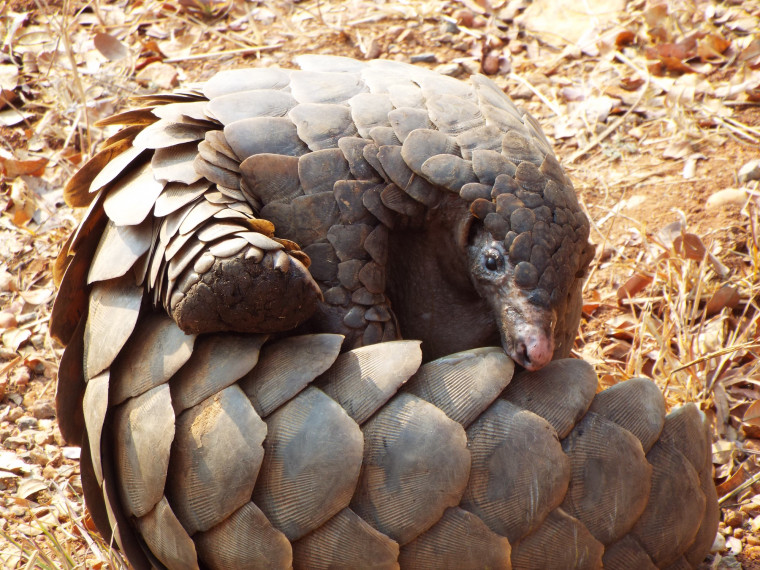Leveraging U.S. Law for the International Protection of Pangolins
Open gallery

Early this morning, we took action to protect pangolins through the filing of a petition under the Pelly Amendment, 22 U.S.C. § 1978, in response to the conservation crisis facing pangolins.
Pangolins are the most trafficked mammal in the world, and China is the primary source of demand for pangolin scales. All eight species of pangolins are threatened with extinction—and the threat appears to be on the rise. In 2019, the International Union for the Conservation of Nature (IUCN) moved three pangolin species into a more serious threat category, based in large measure on the continuing flow of illegal international trade. Most of this trade flows to China for commercial uses, including Traditional Chinese Medicine (TCM).
Through today’s Pelly petition filing, we, along with our partners—the Center for Biological Diversity and the Environmental Investigation Agency UK—have asked the U.S. Secretary of Interior to certify China as diminishing the effectiveness of the Convention on International Trade in Endangered Species of Fauna and Flora (CITES) by maintaining laws and practices that promote trade in contravention of the treaty. The Petition further asks the Secretary to recommend trade sanctions if China does not take concrete action to improve implementation of its international commitments to pangolin conservation.
The Pelly Amendment is a powerful tool to force compliance with international “program[s] for endangered or threatened species.” For species threatened by trade, including pangolins, the most important international treaty is CITES. Together with more than 180 other nations, both the U.S. and China are Parties to CITES. Since 2016, trade in all species of pangolins for primarily commercial purposes has been illegal under CITES. Yet, due to thriving, government-endorsed markets in China, illegal trade has continued to flow to meet this demand. The numbers are staggering. According to the latest United Nations Office of Drugs and Crime (UNODC) report, global pangolin seizures have increased tenfold since 2014, with over 70% of seized scales destined for China.
The Pelly Amendment was designed for situations like this. It allows citizen groups to petition for formal certification of countries whose nationals are “diminishing the effectiveness” of treaties like CITES, whether through outright violations or the maintenance of policies and practices that undermine the treaty’s purposes and rules. In best case scenarios, certification prompts bilateral engagement between the United States and the country subject to the petition, with the United States urging concrete remedial actions. At any point after certification, the President may increase pressure by imposing trade sanctions.
Recent political discourse in the United States, by some actors, has scapegoated China for many things. We do not subscribe to this worldview, nor do our partners. Rather, the Petition is a specific request for diplomatic and strategic engagement on behalf of pangolins by relevant U.S. entities that regularly work with China on conservation issues of international importance. Appropriate trade sanctions may provide helpful leverage in this process.
Although the Chinese government has taken some steps to respond to the pangolin conservation crisis, those steps have failed to address the demand-side drivers of illegal trade. For instance, while recent media reports suggested that the government had “banned” TCM uses of pangolin scales, those reports are not accurate. The government-published Pharmacopeia still includes at least eight patented TCM formulas that use scales. No law in China “bans” TCM use of pangolins. China simply removed pangolin scales from one section of its Pharmacopeia, while maintaining formulas containing scales in another section.
The Petition recommends that China take several actions to secure compliance with CITES and protect pangolins. These include: (1) a decision to entirely shut down the legal market for TCM containing pangolin parts or derivatives; (2) criminalization of possession of illegally imported specimens; (3) an institutional commitment to seek deterrent penalties in all cases involving illegal trade of pangolins; and (4) adoption of a clear confiscation and disposal policy for pangolin scales that enter China illegally, along with destruction of existing stockpiles in a verifiable manner. Such reforms would go a long way to preserving both the integrity of CITES and the survival of eight unique species. Pangolins deserve no less.
We would like to thank the hardworking students in the International Animal and Environmental Law Clinic at Lewis & Clark Law School who worked on this Petition. The Clinic is an innovative collaboration between the Center for Animal Law Studies (CALS) and the #1 ranked Lewis & Clark’s Environmental Law Program. CALS Executive Director, Pamela Hart, underscores the importance of the new collaboration, noting that “The Petition is a perfect and timely example of how specialized expertise in both animal and environmental law can be leveraged to make a difference for animals and the world we live in.”
The complete copy of our Pelly Petition is located here:



The Center for Animal Law Studies (CALS) was founded in 2008 with a mission to educate the next generation of animal law attorneys and advance animal protection through the law. With vision and bold risk-taking, CALS has since developed into a world-renowned animal law epicenter, with the most comprehensive animal law curriculum offered anywhere. In addition, CALS is the only program that offers an advanced legal degree in animal law and three specialty Animal Law Clinics, including our newly launched International Wildlife Law Clinic. CALS is a nonprofit organization and is only able to provide these educational opportunities through donations and grants.
More Center for Animal Law Studies Stories
Center for Animal Law Studies is located in Wood Hall on the Law Campus.
MSC: 51
email cals@lclark.edu
voice 503-768-6960
Center for Animal Law Studies
Lewis & Clark Law School
10101 S. Terwilliger Boulevard MSC 51
Portland OR 97219

